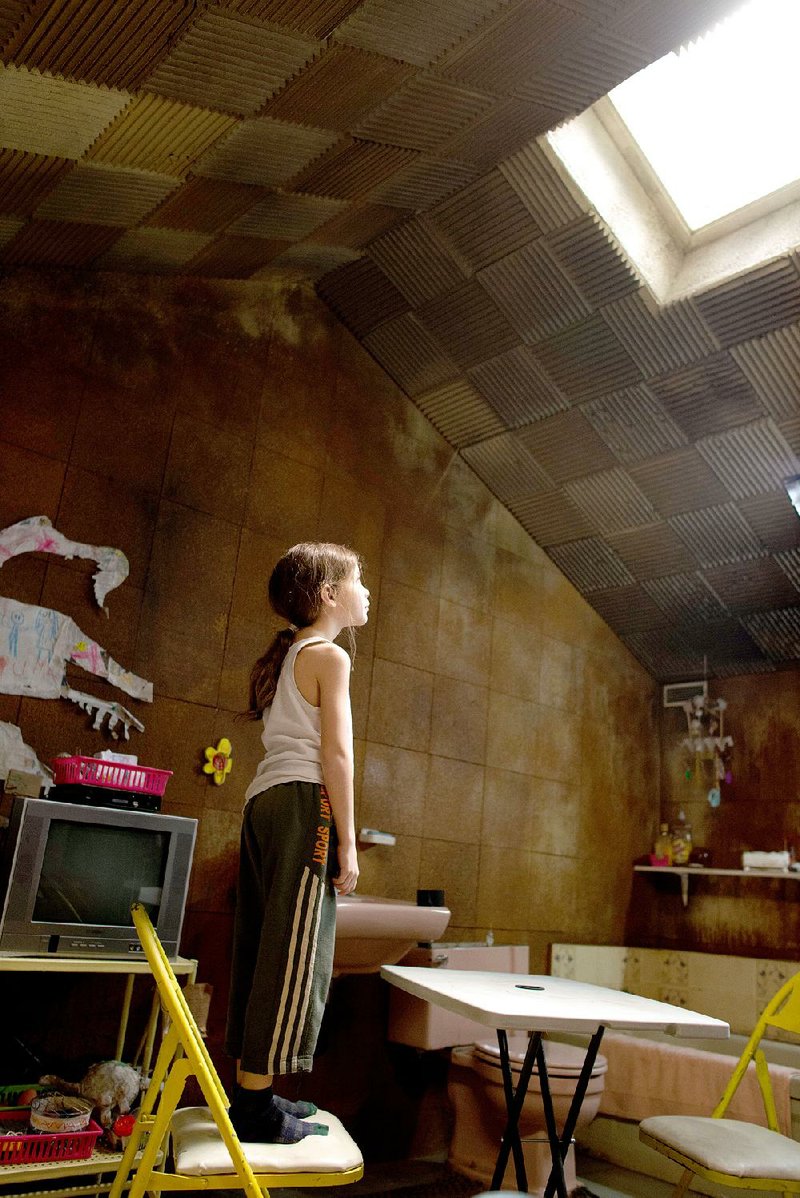Once upon a time, a boy called Jack was born into a circumscribed world, where everything was its own Aristotelian idea. He lived in a kind of cave -- Room -- where outside reality is filtered through a television. His mother -- "Ma," the only woman in the world -- made sure he knew these images were "not real." All that is real was what he could see and touch: Chair, Window, Table, Bed.
And Old Nick, who comes in the night, an emissary from the nonreality that lay beyond Door.
Room
91 Cast: Brie Larson, Jacob Tremblay, Sean Bridgers, Joan Allen, William H. Macy, Wendy Crewson
Director: Lenny Abrahamson
Rating: R, for language
Running time: 118 minutes
This is the premise of Room, one of this year's most talked-up movies.
What we in the theater know, what Jack does not, is that he and Ma are prisoners, that they are being held by Old Nick in a fortified shed in the backyard of his house in a working-class neighborhood in Akron, Ohio. Old Nick (Sean Bridgers) is a kidnapper and a rapist, an echo of real life villains Josef Fritzl and Ariel Castro. He has installed himself as the god of the 10-by-10 world Ma (Brie Larson) and Jack (Jacob Tremblay) inhabit, he bestows favors -- a package of underwear makes a "Sunday treat" -- when they are properly obedient. He punishes them when they are "bad" by turning off their heat. That he is Jack's father is understood.
Ma has lived in Room for seven years, and on Jack's fifth birthday, she imparts the knowledge. There is a world beyond Room, that looks like the world on TV. The world he knew as unreal. She thinks he is old enough to know. But he cannot believe her, not at first. It takes time for him to understand what she is saying -- to imagine that the universe does not stop at Wall requires all the faith he can muster. It requires courage.
Ma tells Jack the plan and makes him practice.
This is the first hour or so of Room, a remarkably tense thriller directed by Lenny Abrahamson, which was based on the novel by Emma Donoghue, who wrote the screenplay. In the second half of the film, the action occurs in the real world, and we meet the family Ma was snatched away from, and issues of reintegration are explored. The subtler, more complicated attentions of a wide world are substituted for the absolute evil of Old Nick.
Most fairy tales are, at their base, horror stories. Riffle through any edition of tales by the Brothers Grimm or the unsentimental Charles Perrault. You'll see the darkness. Even in the Disneyfied versions, macabre details sometimes bleed through -- as when an evil queen insists the huntsman return to her with Snow White's heart in a jewel box.
Room is a kind of fairy tale, woven out of tabloid headlines. It is a little like The Truman Show, stripped of its sci-fi. Because the film is set in Ohio, near Cleveland, we might assume that Donoghue, a Canadian-Irish writer, might have been riffing on the Castro case. But her novel was published before the three women Castro had abducted escaped. It must have been harrowing for her to realize that her darkest imaginings were within the ken of her kind.
Abrahamson is an Irish director, well-regarded in his home country, whose last film was Frank, a story about a mad genius that started out whimsical and ended up honest and sober. In a way, Room follows this pattern, for while we immediately grasp the horror inherent in Ma and Jack's world, Jack is innocent, free to believe that things are as they should be. There is trauma and harm beyond the walls; there is a risk to being born.
This movie is a wonder in several ways. The casting is sharp and the performances of such a caliber that awards talk is unavoidable. Larson and Tremblay are making lists, and Joan Allen and William H. Macy are reliable. Someone should say something about Bridgers, who is able to communicate the sadness and disappointment inherent in a monster.
The cinematographer, Danny Cohen, is able to make the Room world close and thrilling, rich with plain beauty. (And the outside is green and busy and once we get out of Old Nick's neighborhood which, it must be said, looks a lot more like suburban Toronto than rusty old Ohio.)
Some people might not like the things this movie makes you feel. It picks at tightly knotted connections, those between mother and child, between jailer and detainee. There is a moment when Macy refuses to look at his freshly discovered grandson that is heartbreaking and honest -- that reveals the ugliness of which we're all capable. This is a movie that might make you clench your fists. This is a movie that might make you feel bad. Consider this your trigger warning.
But it is optimistic, too, and maybe that's a kind of flaw as well. Because what doesn't kill us often makes us weaker and more frail, and less able to trust those who want the best for us. We only wish trouble would hone our wits -- more often the damage we sustain does us in.
Still, we are left with the idea that Jack will be all right. That he will grow up and be more like Ma than Old Nick, that he will someday tell his grandchildren a story about the place where he comes from. "Happily ever after" is such a pretty lie.
MovieStyle on 01/22/2016
